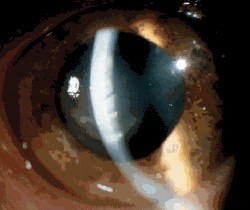A new study has found that almost everyone carries ocular herpes simplex.
Specifically, 98% of healthy, asymptomatic participants shed herpes simplex virus type 1 (HSV-1) in their tears and saliva at least once during a 30-day study, the results of which appeared in Januarys Investigative Ophthalmology and Visual Science.
Researchers at Louisiana State University Eye Center recruited 50 participants, ages 19 to 71, who had no signs of ocular herpetic disease. Nineteen were male and 31 were female. Seventy-eight percent of the participants were African-American. Participants provided blood, saliva and tear samples twice a day for 30 consecutive days. Samples were tested for HSV IgG antibodies by enzyme-linked immunosorbent assay (ELISA) and for HSV-1 by neutralization assay.
Of the 50 subjects, 74% (37) tested positive for HSV IgG by ELISA. The percentages of positive results for eye and mouth swabs were almost equal33.5% and 37.5%, respectively. The frequency that tears tested positive was statistically the same in men (34.6%) and women (34.8%), but mens saliva tested positive more frequently (45.3%) than womens (33.1%). Overall, 49 of 50 subjects (98%) shed HSV-1 DNA at least once during the 30-day study.
The prevalence of HSV infections is affected by many factors, including population demographics, age, stress, socioeconomic status, education level, age of first sexual intercourse and total years of sexual activity, the researchers say. Sunlight exposure, which may activate latent HSV, may also have been a contributing factor to HSV-1 DNA shedding.
HSV is typically transmitted when patients are asymptomatic. In order to control the spread of HSV, further knowledge about its prevalence in tears and saliva is necessary, the researchers say. The shedding of HSV may be inhibited by anti-virals, but this has not been adequately studied, says the lead author, ophthalmologist Herbert E. Kaufman, M.D., Spread of virulent strains could be controlled.
Dr. Kaufman reminds optometrists to consider that the presence of HSV in the tears of asymptomatic individuals emphasizes that after immunosuppression or ocular surgery with corticosteroid administration, corneal ulcers that may not look typical sometimes develop. These corneal ulcers are caused by herpes and need to be treated as such.
Specifically, 98% of healthy, asymptomatic participants shed herpes simplex virus type 1 (HSV-1) in their tears and saliva at least once during a 30-day study, the results of which appeared in Januarys Investigative Ophthalmology and Visual Science.
Researchers at Louisiana State University Eye Center recruited 50 participants, ages 19 to 71, who had no signs of ocular herpetic disease. Nineteen were male and 31 were female. Seventy-eight percent of the participants were African-American. Participants provided blood, saliva and tear samples twice a day for 30 consecutive days. Samples were tested for HSV IgG antibodies by enzyme-linked immunosorbent assay (ELISA) and for HSV-1 by neutralization assay.
Of the 50 subjects, 74% (37) tested positive for HSV IgG by ELISA. The percentages of positive results for eye and mouth swabs were almost equal33.5% and 37.5%, respectively. The frequency that tears tested positive was statistically the same in men (34.6%) and women (34.8%), but mens saliva tested positive more frequently (45.3%) than womens (33.1%). Overall, 49 of 50 subjects (98%) shed HSV-1 DNA at least once during the 30-day study.
 |
| Latent herpes simplex virus can lead to this, HSV disciform stromal keratitis. |
The prevalence of HSV infections is affected by many factors, including population demographics, age, stress, socioeconomic status, education level, age of first sexual intercourse and total years of sexual activity, the researchers say. Sunlight exposure, which may activate latent HSV, may also have been a contributing factor to HSV-1 DNA shedding.
HSV is typically transmitted when patients are asymptomatic. In order to control the spread of HSV, further knowledge about its prevalence in tears and saliva is necessary, the researchers say. The shedding of HSV may be inhibited by anti-virals, but this has not been adequately studied, says the lead author, ophthalmologist Herbert E. Kaufman, M.D., Spread of virulent strains could be controlled.
Dr. Kaufman reminds optometrists to consider that the presence of HSV in the tears of asymptomatic individuals emphasizes that after immunosuppression or ocular surgery with corticosteroid administration, corneal ulcers that may not look typical sometimes develop. These corneal ulcers are caused by herpes and need to be treated as such.
Kaufman HE, Azcuy AM, Varnell ED, et al. HSV-1 DNA in tears and saliva of normal adults. Invest Ophthalmol Vis Sci. 2005;46(1):241-7.
Vol. No: 142:2Issue:
2/15/05

